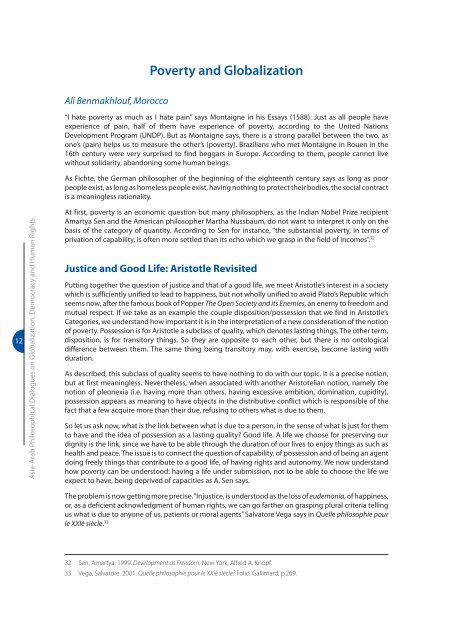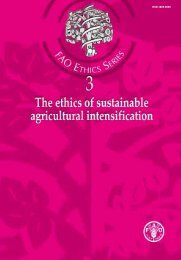Asian-Arab philosophical dialogues on globalization, democracy ...
Asian-Arab philosophical dialogues on globalization, democracy ...
Asian-Arab philosophical dialogues on globalization, democracy ...
You also want an ePaper? Increase the reach of your titles
YUMPU automatically turns print PDFs into web optimized ePapers that Google loves.
Poverty and Globalizati<strong>on</strong><br />
12<br />
Asia-<str<strong>on</strong>g>Arab</str<strong>on</strong>g> Philosophical Dialogues <strong>on</strong> Globalizati<strong>on</strong>, Democracy and Human Rights<br />
Ali Benmakhlouf, Morocco<br />
“I hate poverty as much as I hate pain” says M<strong>on</strong>taigne in his Essays (1588). Just as all people have<br />
experience of pain, half of them have experience of poverty, according to the United Nati<strong>on</strong>s<br />
Development Program (UNDP). But as M<strong>on</strong>taigne says, there is a str<strong>on</strong>g parallel between the two, as<br />
<strong>on</strong>e’s (pain) helps us to measure the other’s (poverty). Brazilians who met M<strong>on</strong>taigne in Rouen in the<br />
16th century were very surprised to find beggars in Europe. According to them, people cannot live<br />
without solidarity, aband<strong>on</strong>ing some human beings.<br />
As Fichte, the German philosopher of the beginning of the eighteenth century says as l<strong>on</strong>g as poor<br />
people exist, as l<strong>on</strong>g as homeless people exist, having nothing to protect their bodies, the social c<strong>on</strong>tract<br />
is a meaningless rati<strong>on</strong>ality.<br />
At first, poverty is an ec<strong>on</strong>omic questi<strong>on</strong> but many philosophers, as the Indian Nobel Prize recipient<br />
Amartya Sen and the American philosopher Martha Nussbaum, do not want to interpret it <strong>on</strong>ly <strong>on</strong> the<br />
basis of the category of quantity. According to Sen for instance, “the substantial poverty, in terms of<br />
privati<strong>on</strong> of capability, is often more settled than its echo which we grasp in the field of incomes”. 32<br />
Justice and Good Life: Aristotle Revisited<br />
Putting together the questi<strong>on</strong> of justice and that of a good life, we meet Aristotle’s interest in a society<br />
which is sufficiently unified to lead to happiness, but not wholly unified to avoid Plato’s Republic which<br />
seems now, after the famous book of Popper The Open Society and its Enemies, an enemy to freedom and<br />
mutual respect. If we take as an example the couple dispositi<strong>on</strong>/possessi<strong>on</strong> that we find in Aristotle’s<br />
Categories, we understand how important it is in the interpretati<strong>on</strong> of a new c<strong>on</strong>siderati<strong>on</strong> of the noti<strong>on</strong><br />
of poverty. Possessi<strong>on</strong> is for Aristotle a subclass of quality, which denotes lasting things. The other term,<br />
dispositi<strong>on</strong>, is for transitory things. So they are opposite to each other, but there is no <strong>on</strong>tological<br />
difference between them. The same thing being transitory may, with exercise, become lasting with<br />
durati<strong>on</strong>.<br />
As described, this subclass of quality seems to have nothing to do with our topic. It is a precise noti<strong>on</strong>,<br />
but at first meaningless. Nevertheless, when associated with another Aristotelian noti<strong>on</strong>, namely the<br />
noti<strong>on</strong> of ple<strong>on</strong>exia (i.e. having more than others, having excessive ambiti<strong>on</strong>, dominati<strong>on</strong>, cupidity),<br />
possessi<strong>on</strong> appears as meaning to have objects in the distributive c<strong>on</strong>flict which is resp<strong>on</strong>sible of the<br />
fact that a few acquire more than their due, refusing to others what is due to them.<br />
So let us ask now, what is the link between what is due to a pers<strong>on</strong>, in the sense of what is just for them<br />
to have and the idea of possessi<strong>on</strong> as a lasting quality? Good life. A life we choose for preserving our<br />
dignity is the link, since we have to be able through the durati<strong>on</strong> of our lives to enjoy things as such as<br />
health and peace. The issue is to c<strong>on</strong>nect the questi<strong>on</strong> of capability, of possessi<strong>on</strong> and of being an agent<br />
doing freely things that c<strong>on</strong>tribute to a good life, of having rights and aut<strong>on</strong>omy. We now understand<br />
how poverty can be understood: having a life under submissi<strong>on</strong>, not to be able to choose the life we<br />
expect to have, being deprived of capacities as A. Sen says.<br />
The problem is now getting more precise. “Injustice, is understood as the loss of eudem<strong>on</strong>ia, of happiness,<br />
or, as a deficient acknowledgment of human rights, we can go farther <strong>on</strong> grasping plural criteria telling<br />
us what is due to any<strong>on</strong>e of us, patients or moral agents” Salvatore Vega says in Quelle philosophie pour<br />
le XXIè siècle. 33<br />
32 Sen, Amartya. 1999. Development as Freedom. New York, Alfred A. Knopf.<br />
33 Vega, Salvatore. 2001. Quelle philosophie pour le XXIè siècle? Folio, Gallimard, p.269.

















